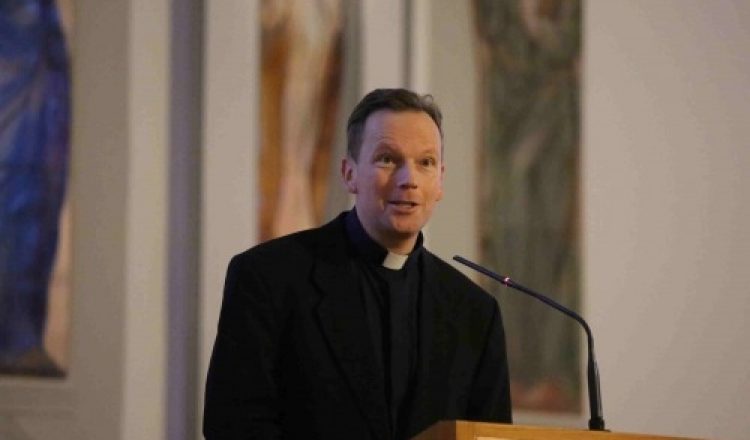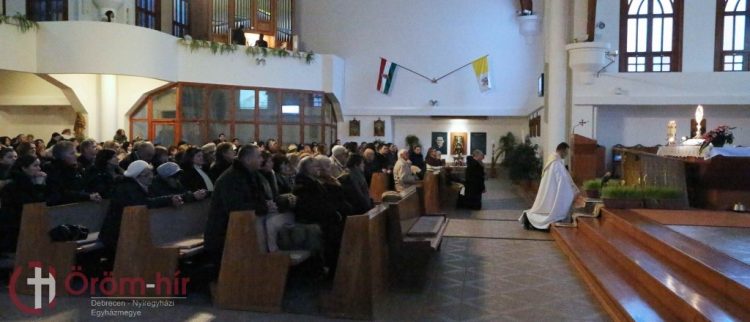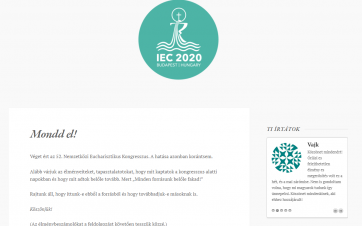
Halfway through the organization

First half of the three-year preparation period for the 52nd International Eucharistic Congress (IEC) has passed. This global event will be held in Budapest between 13–20 September 2020. We sat down for an interview with Father Kornél Fábry, Head of Secretariat of IEC.
– Shortly after the announcement in 2016 that Hungary would be the host of the Congress, Cardinal Péter Erdő invited you to be the Secretary General of IEC, and you had to leave your former position in the town of Kaposfüred to come to Budapest. Why were you chosen for this position?
– It was a big surprise and a great honour at the same time; and I accepted it after spending a long time in prayer, confident in my decision. It has brought changes to my life, but my mission remained the same. I have had some experience in organizing youth gatherings, and I was also the program manager of HungaRio (catholic youth days in Hungary in 2013), but – since we’re talking about the celebration of the Eucharist – I can say that my life is centered around the Blessed Sacrament. Since I am a member of the Emmanuel Community, daily mass and Eucharistic adoration are of first priority to me. In Kaposfüred I have experienced the beneficial effect of these on others as well. We have been able to introduce all day Eucharistic adoration to our parish, which has revitalized and strengthened the local community and has allowed it to grow ten times its original size in a few years. Maybe that’s why I was chosen.
– Who is helping you? What is the background work like?
– The core of the organizer team is the IEC. Beside that, we can count on the help of theological, pastoral and arts committees, diocesan representatives of the National Eucharistic Committee, members of the Social Committee, volunteers, parish representatives of Esztergom-Budapest Archdiocese trained specifically for this task. We are happy to share the training method of the latter with any diocese so that they can learn more about engaging the laity in pastoral work. Vittore Boccardi, Secretary of the Pontifical Committee for International Eucharistic Congresses also helps us frequently and shares his experience with us.
The one-week event in Budapest will be the summit of our work, but hopefully not an end of it. Our aim is not to show off or revive the afterfeel of ’38 (the 34th International Eucharistic Congress in 1938 was also organized in Budapest), but to provide an opportunity for spiritual renewal. This is why we pray at the end of each Sunday mass: “Grant us, [...] that the celebration of the Eucharistic Congress would serve the spiritual renewal of our community, cities, nation, Europe and the world”. The main goal for those who are already Catholic is to get closer to the Eucharist, the mass, the Eucharistic adoration; and for those who are unbelievers to meet Jesus Christ as a result of this preparation, through the testimonies of the believers. Thus the final purpose of the entire Congress is a spiritual rebirth and sharing the Gospel – the good news - with everyone.
– The nationwide tour of the Golden Train transporting the relic of the Holy Right of St Stephen (first king of Hungary) was a highlighted event of the St Stephen’s Year and Eucharistic Congress in ‘38. This will be repeated, as we heard.
– In commemoration of this event, the train will be re-created, but instead of the Holy Right, an exhibition centered around the Congress is expected to be installed in it. Looking at the period of 1938 in a historical context, we know that we were before World War II, and the Congress was a cry for peace, hoping that the war may be prevented. The world has changed since then. At that time there was a “folk church” in Hungary, faith and traditional religiousness were a part of people’s everyday lives. Thanks to this, they were able to hold an Eucharistic adoration ceremony with 150 thousand men, and held a holy mass exclusively for police officers. However, there was neither television nor internet at that time, both of which have a great influence on our everyday lives today. Looking at the number of people attending mass on Sundays, we cannot speak of a “folk church” any longer, and we only reach a small proportion of youth as well. I trust that the Congress will be an opportunity to reach out to people.
– In the nine-point mission statement of the 2020 Congress you have stated that we wish to be a “Eucharistic” yeast for people and denominations.
– Jesus said: we should be like yeast, the light of the world, the salt of the earth. Us, Christians must be different from other people, but should not elevate ourselves above them – be like them. Do everything that unbelievers do, apart from the sin. They will listen to us if we work, organize, etc. together with them, but at the same time we should live in a way that makes them ask why we are different from other people. We evangelize with our lives, as St. Francis says: “Preach the Gospel at all times. Use words if necessary.” I would like to encourage everyone to act this way, and the Eucharist is a great resource for that.
– The three preparatory years that lead up to the Congress, spanning from Pentecost to Pentecost, also help with this.
– The motto of the first year was: “IEC: For You – with You” The Eucharist is the source of our lives as Christians. In the first year we have focused on strengthening the personal bond with Christ. We published a booklet to help these efforts with 170 ideas that can be implemented in parishes, schools, communities and families. The motto of the second year is “IEC: For You – with the Community”, and our goal is to strengthen the communities of the Church, according to Jesus: “By this everyone will know that you are my disciples, if you love one another” (John 13:35). Our experience is that only 10% of believers are actively involved in the life of the parishes, but 40% would do it if they were asked to. So this year opens up an opportunity to involve the laity in organization, prayer and community building. In the first year, the Eucharistic adoration was emphasized through a program named Course of Eucharistic Adoration, in the second year, the mass will be in focus. The thematical booklets of each year are very useful, they can be downloaded from the website www.iec2020.hu. Moreover, a smartphone application is also in the development funnel, with the purpose of combining www.miserend.hu and www.szentsegimadas.hu. The third year will be the year of mission. After we have become stronger as individuals and as communities, we’ll have a place to invite people to, but we can do that primarily by being faithful witnesses and living an authentic Christian life. Next year’s booklet will be published at this year’s Pentecost. I warmly recommend Michael White and Tom Corcoran’s recently published book, “Rebuilt”, which is about turning a lifeless parish into a missionary parish.
– What other programs will be leading up to the main event?
– This May we will be hosting the delegations of ninety nations for three days who are organizing their own events in their own countries in preparation for the Congress. We will show them around the locations and present the finalized program. The core document of the Congress has also been translated into Italian and English languages. It has been compiled by the theological commission, and hopefully it will be available to everyone in Hungarian early spring, and we will continue to publish it in other languages as well. Whit Monday will open the third preparatory year, and then we will invite the world again for a common adoration on the Saturday before Corpus Christi, on 22 June. We will have a thematic exhibition this year as well; we are planning to continue with the summer camp for young Catholic musicians (KAZETTA), and on 21 September we are inviting young people between the ages 15-30 to our “Forráspont” event (please check out our short video summary of last year’s “Forráspont”), in the BOK Hall that accommodates six thousand people. On the vigil of the feast of Christ the King, a worldwide adoration will be held again, and in November there will be an Eucharistic conference in Esztergom. We would like to make the liturgy come alive, so this year is centered around the mass. This February we are launching a 12-episode video blog series of 6-8-minute videos explaining the mass, a video-based commentary on masses, which can be useful in religious education as well. Many people don’t know the meaning of the events that happen during mass, and this can serve as catechesis for them.
– How are you progressing with the organization? Are there any elements that you would say are ready?
– Yes, everything is progressing according to plan; we have booked the venues, and have done even more through the global Eucharistic adoration we have organized. We have achieved that two and a half years before the event, people from other continents already know about the event in Budapest. In 2017, 840 locations from 18 countries joined our initiative. In 2018 we were inviting the world for Corpus Christi with a multilingual website with eight languages, and 907 locations from 45 countries joined us as a result; while on the Saturday before Christ the King Sunday, 1,070 locations were with us. We received feedback from Japan that thanks to this, they will hold Eucharistic adoration on a weekly basis. The Budapest Congress is already having an effect on Japan. In Hungary, 640 locations have joined. In the preparatory years leading up to the Congress, we have held and will hold worldwide Eucharistic adoration six times altogether.
– The preparatory years have already yielded results.
– The fact that the churches – where Jesus Christ is truly present – are opening up is a huge result. Let us not keep the churches closed! If someone is scheduled to pray there for each hour, that person can also take care of the guarding of the church. The house of God is a force field of grace. I do believe that real presence does have an effect. Sopron, Vác, Sülysáp, Veszprém, Kaposvár, Budapest, Nagymaros, Piliscsaba – it is possible to join in to an Eucharistic adoration at these places from the morning till late evening, or even 0-24. I trust that we will keep receiving the news of additional churches being opened.
– How does information reach the dioceses and parishes?
– We like going to priests’ recollections so that we can talk to the fathers in person, because then they have a very different attitude towards the event and the preparatory years. They become much more active. Although the central event will be held in Budapest, it has a direct influence on the whole country. The nationwide joint first communion is another opportunity for this. The three-year-long preparations happen at a local level. We are in the middle of it now, and the summit of our work will be the one-week event. More than 15,000 people have signed up to our newsletter so far. This way they stay informed about the progress of the organization and the events.
– At the Congress held in Cebu City in 2016, 5000 children participated in the first communion event. Children and adults receiving first communion are invited to the opening event in Budapest as well. How is this opportunity received by the dioceses?
– Between 10-12 September 2020 we will be holding an Eucharistic Symposium with the participation of theologians in the St. Adalbert Centre in Esztergom. The opening mass will be held on 13 September at 4pm in the Puskás Stadium that accommodates 65,000 people. This is combined with the first communion celebration to which we are inviting children and adults who first receive the Eucharist this year, from the whole country and from Hungarian parishes outside the borders.
Applications for this first communion can also be made at the parishes. And the anticipated number of people needs to be submitted to the diocesan offices by 20 May 2019. We have seen two kinds of reactions. There are those who are already anticipating the big event very enthusiastically, while others wish to experience the first communion as an intimate family event. People receiving first communion will be wearing centrally provided white dresses, will be given a commemorative coin of the event. Parents can stay close to their children during the ceremony. We encourage the parishes to make a local celebration on the Sunday after the Congress for those who received first communion at the event in Budapest, so that the parish can celebrate it as well. I feel it is important for all children receiving first communion to choose the joint ceremony because this is a once-in-a-lifetime opportunity. The presence of thousands of children will also be an exceptional opportunity to bear witness in front of the entire world, because we direct people’s attention to Christ through this. A high number of people receiving first communion together evangelise with their mere presence.
During the week of the event, in the mornings through early afternoons, spiritual events will be available to visitors in pavilion A of the Hungexpo building as a part of the Congress. We will start the day with common prayer in the mornings, and then speakers from all around the world will give catecheses, followed by testimonies and Holy Mass. Following the workshops various optional cultural programs will be waiting the participants. Registration for the event – the entire week or just one day – will start in September 2019, one year before the event. There has also been a pre-registration option available on the website (www.iec2020.hu) for a long time.
In the afternoons, visitors can attend cultural, religious and evangelization programs in different parts of the city. Following a Hungarian tradition – Ars Sacra Festival, the Week of Christian Art will be organized the same week. Among our invited guest artists are for example Csík Zenekar ensemble, Saint Ephraim Male, the Moscow Patriarchal Choir. Next season of the Hungarian State Opera will bear the title of “Christian Season”, performing operas with Christian thematics; and many other institutions have also joined our program already.

– Young people are also preparing for the Congress at the “Forráspont” Eucharistic youth day.
– We have thought of young people as well. Although the entire week is open to them, there will be programs prepared specifically for them in the period between Thursday evening and Sunday. On Thursday, 17th September an Eucharistic adoration will be held with the participation of the communities in front of St. Stephen’s Basilica, and a separate youth night will be organized for them on Friday in the Papp László Sports Arena.
Saturday - 19th September will be the day of families, and a festive Holy Mass will be celebrated in front of the Houses of Parliament from 17:00. Following that we will walk in candlelight Eucharistic procession to Heroes’ Square. Ministrants will also have the opportunity to join in the service at the Holy Masses. And at 11 a.m., 20 September the 52nd International Eucharistic Congress in Budapest will end with the Statio Orbis, the concluding mass at Heroes’ Square. This is when Pope Francis will announce the next location either in person or in a video message. Of course, the Holy Father has received invitations both from the government and the Church.
People can keep themselves updated about the events at www.iec2020.hu or even by subscribing to our newsletter, where all information, preparation materials, an event calendar and conference materials are available. Let us love the Church, because we are the Church, and Jesus has entrusted us with passing on the good news. Let us be authentic Christians and faithful witnesses among our fellow men, because we are the advertisers of Christ and the whole is judged by us as individuals.
Let us support the success of the preparatory years and the Congress with our prayers, the encouragement of others, and our participation. Let us be in constant contact with Jesus Christ, let us pray for the spiritual renewal of people at the masses and Eucharistic adorations.
An American sister said the following when she visited Hungary: “Ever since I arrived, I’ve had the feeling that the 2020 Eucharistic Congress will have a great effect on all Catholics in the world.” It is my belief that the Congress will bring renewal to the whole world.
Jesus is truly present in the Eucharist; let us open our churches so that the people can meet Him.
“Spend as much time as possible in front of the Blessed Sacrament and He will fill you with His strength and His power.” (Saint Mother Teresa of Calcutta)
Source: Ágnes Kovács/Diocese of Debrecen-Nyíregyháza










